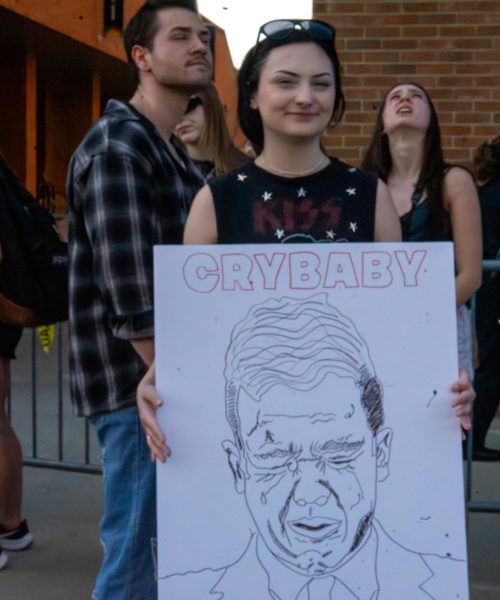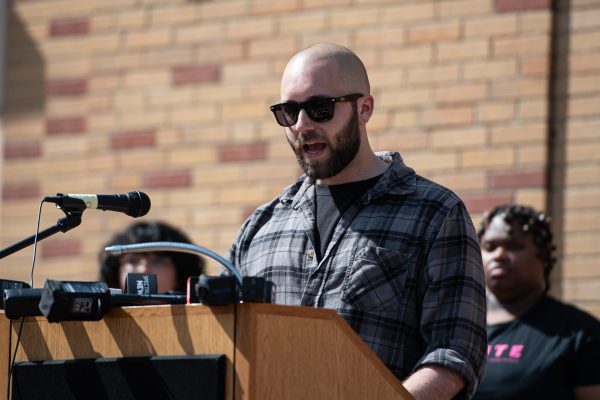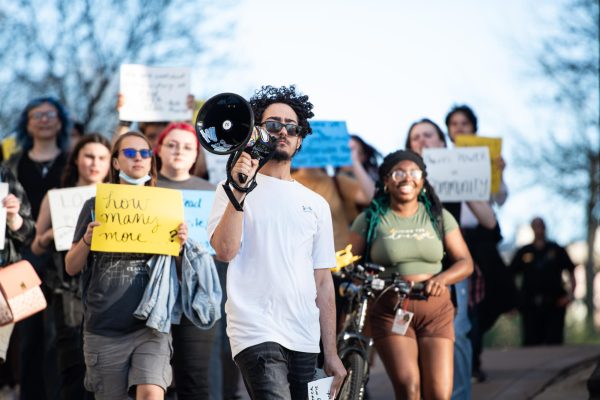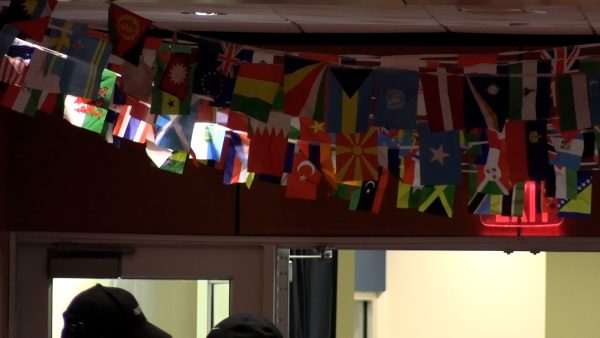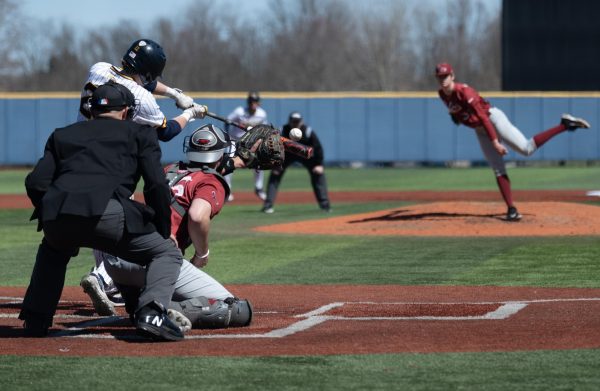Taking a new direction
April 10, 2007
On March 15, all nine members of the Improve Our University ticket won the student vote and Undergraduate Student Senate senator positions for next school year. That ticket’s biggest selling point was change — change in the way students view USS, change in the way students collaborate with each other and with administration, change in how students enjoy their time at Kent State.
As the new USS officially took office yesterday, the members of the Daily Kent Stater editorial board feel we have a few pieces of advice for the senators to help take the undergraduate student body in a new and better direction.
- For Executive Director Katie Hale:
Obviously, the student voters believed in her enough to get the job done, but Katie Hale has the most to prove. Hale is responsible for spearheading the successful campaign of the Improve Our University (I.O.U.) ticket. We hope she can be equally successful in creating what her ticket promised: change.
Hale outlined seven major platform goals during March’s election. We’d like to see her follow through on the major ones, specifically including keeping the Rathskeller open for longer hours, while working simultaneously on the smaller goals.
To put it bluntly, Hale’s win has garnered her a bunch of flak. We hope she continues to take criticism in stride and focus on her biggest duty —ÿimproving the lives of Kent State students.
Delegating responsibilities and making tough choices will be constant in Hale’s life next semester. We want to see her follow through with her promises and make sure her board does the same.
- For Academic Affairs Sen. Kali Price:
Making the switch from student media leader to USS senator is going to be a big one. We’d like to see Price apply her skills of effective planning to the disaster that is the KAPS report. This should be her biggest priority, because it is the biggest headache under her title that effects (and frustrates) all students. Price should do this by doing more than talking to more than just students in First Year Experience classes and making a pamphlet. Take the problems straight to those who control KAPS.
The other goal Price outlined that she should focus on is universalizing the plus/minus system. It’s sad that it has taken this long for someone to speak out about the unfairness of the current system, and we’re glad Price has. We hope this continues to be a priority throughout the semester.
- For Business and Finance Sen. Andrew Ljubi:
Incoming Business and Finance Senator Andrew Ljubi didn’t have any opposition. The editorial board’s goal for him is simple: Don’t screw up.
Ljubi’s platform doesn’t really expand on anything current or add anything new. His goals are to basically stay the course and do his job well. In what is perhaps the most important senatorial position, that is exactly what Ljubi needs to do. This is the person in charge of allocating the money available to student groups (with the help of a committee, which he chooses).
This editorial board just asks for one thing from him: Make the allocations process transparent. The student body wants to know how much of its money is being spent, and where.
- For Community Affairs Sen. Jonathan Bey:
Jonathan Bey has a considerable task ahead. He has to maintain, if not improve, the relationship between the student body and the city. He has promised to work with the Community Task Force and turn it into a registered student organization. That is a great first step in helping students and residents be good neighbors: the first step of hopefully many more.
He also needs to make sure students are aware of the nuisance ordinance and how to protect themselves. Some parts of the ordinance go too far. Students will need his help in understanding and following the law.
- For Governmental Affairs Sen. John Wetmore:
John Wetmore was dynamic and confident at the USS open forum before elections; now, it’s time for him to take that enthusiasm and use it to implement real change for the students.
To be successful in his role as senator for Governmental Affairs, Wetmore will have to interact with students, administrators and politicians to bring about change. He plans to meet with political groups on campus and hold forums to let students discuss state legislation and government. We’d like to see him do more to explain to students what issues actually affect them at that level.
He has a good start, with plans to lobby the state
government for tax-free textbooks and increased Pell Grant funding, and to ask the university to sponsor a music file sharing system. Let’s hope Wetmore can follow through on his promises and make at least some of these goals reality.
- For Research and Development Sen. Michael Hammond:
Michael Hammond was very excited to take this senatorial position, and this attitude will help him succeed. With a student body of more than 20,000, he has a lot of voices to hear.
His campaign ideas sounded great, and we hope he follows up on all of these. The street team sounds like a great way to talk to the students who don’t normally speak up about what they want. As we’ve seen in the past several years, most students don’t participate either because they don’t know enough about the subject or they don’t know who to go to. If Hammond lives up to his promises, this should help alleviate one half of the problem.
- For Student Advancement Sen. Megan Lynn:
Megan Lynn is going to have to break away from tradition to make this position work. She wants to continue the use of the Student Input Advisory Committee and re-instate the Student Leadership Development Board, but it’s been shown again and again that students are sick of committees. They don’t work. Lynn is the senator for Student Advancement, and advance is just what she will need to do. The first step Lynn must take is finding a new way to engage students and find out what they want. She can’t make changes on their behalf until she successfully reaches them.
Lynn doesn’t seem to have any idea of what changes she would like to make as senator. While it’s good that she’s not trying to speak for the students until she talks with them, that’s scary. We’d like to see her set some concrete goals soon, so she can begin acting on them as soon as school resumes for the fall semester.
- For Student Relations Sen. Elizabeth Eckels:
Elizabeth Eckels has one of the more interesting jobs on USS. In her column in the Daily Kent Stater that ran the day of elections, Eckels touted her creativity. We’d like to see her couple that with effective programs.
As the liaison between students and administrators in charge, we’d like to see Eckels break from the norm and institute new programs and opportunities for students to connect with these heads of Kent State. Do more than just Coffee with the President; do coffee with all the administrators. Do more than the President’s Roundtable; do the Virtual President’s Roundtable and consistently encourage the involvement of all student groups — not just the big ones.
- For University Affairs Sen. Jonithon LaCross:
Though incoming Senator for University Affairs Jonithon LaCross backed his way into the position after Nikole Keslar dropped out of the race, the editorial board thought he was the right person for the job all along.
Now, LaCross just needs to follow through with what he said he wanted to do in his platform. Yes, he said he wants to make the All University Hearing Board a more viable option for students in trouble, as well as better train Judicial Advocates.
But for LaCross’s year to be successful, this editorial board thinks he needs to make good on one promise in particular: He has vowed to be personable and approachable to students, and to get face-to-face with students as much as possible to educate them about USS and different services available to them. This promotes transparency within student government, and that’s a good thing.
Also, LaCross, as the only non-I.O.U. ticket senator, must show he can work with the rest of the senators for the benefit of the student body. We don’t think he’ll have a problem.
- For the entire Undergraduate Student Senate:
Next year is important for USS because, unless the Board of Trustees overturns the decision, it will be a sort of transition year into what is to become the Undergraduate Student Government. The current senators will have to be focused on making the transition as smooth as possible, while also concentrating on their own goals from this year.
Improve relations with the All Campus Programming Board and Black United Students. After the hotly contested seat removal from the Allocation Committee, which is affiliated with USS, the senators should make a concerted effort to show that these groups are not being removed from the table completely. This year is a chance for the student government to improve relations with all student groups —ÿwhich would result in a more representative government overall.
As the student government, the USS needs to improve its transparency. We were far from pleased with the USS being less than completely upfront about its referendum on its Web site prior to the past election. Senators, with a few exceptions, do not have a great track record of being in the office during appointed times.
The purpose of the USS is to serve the student body. If students feel the senators are unavailable, then they aren’t doing their jobs. Remember, while the USS has some power, it’s only because the students gave it to them. Senators have an obligation to the student body and they must fulfill it.













